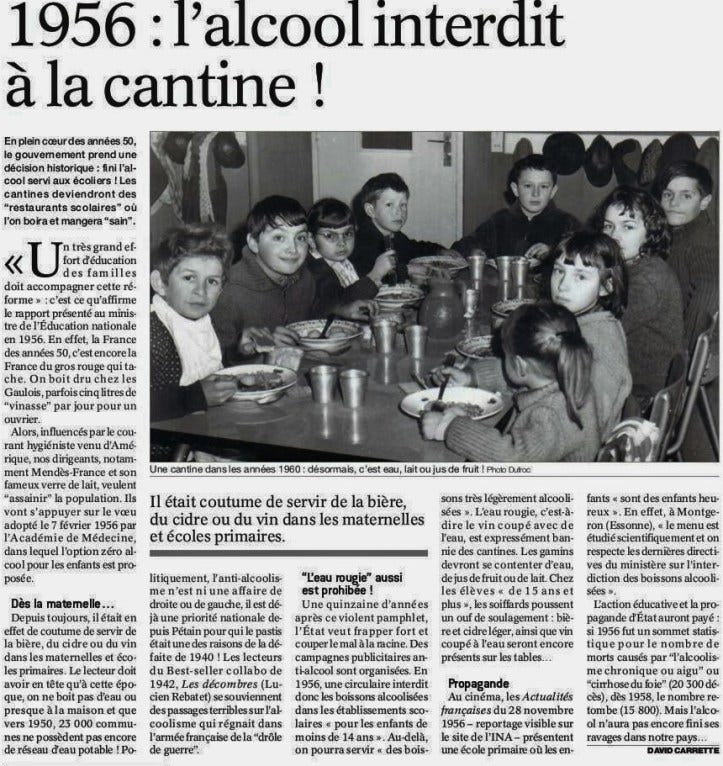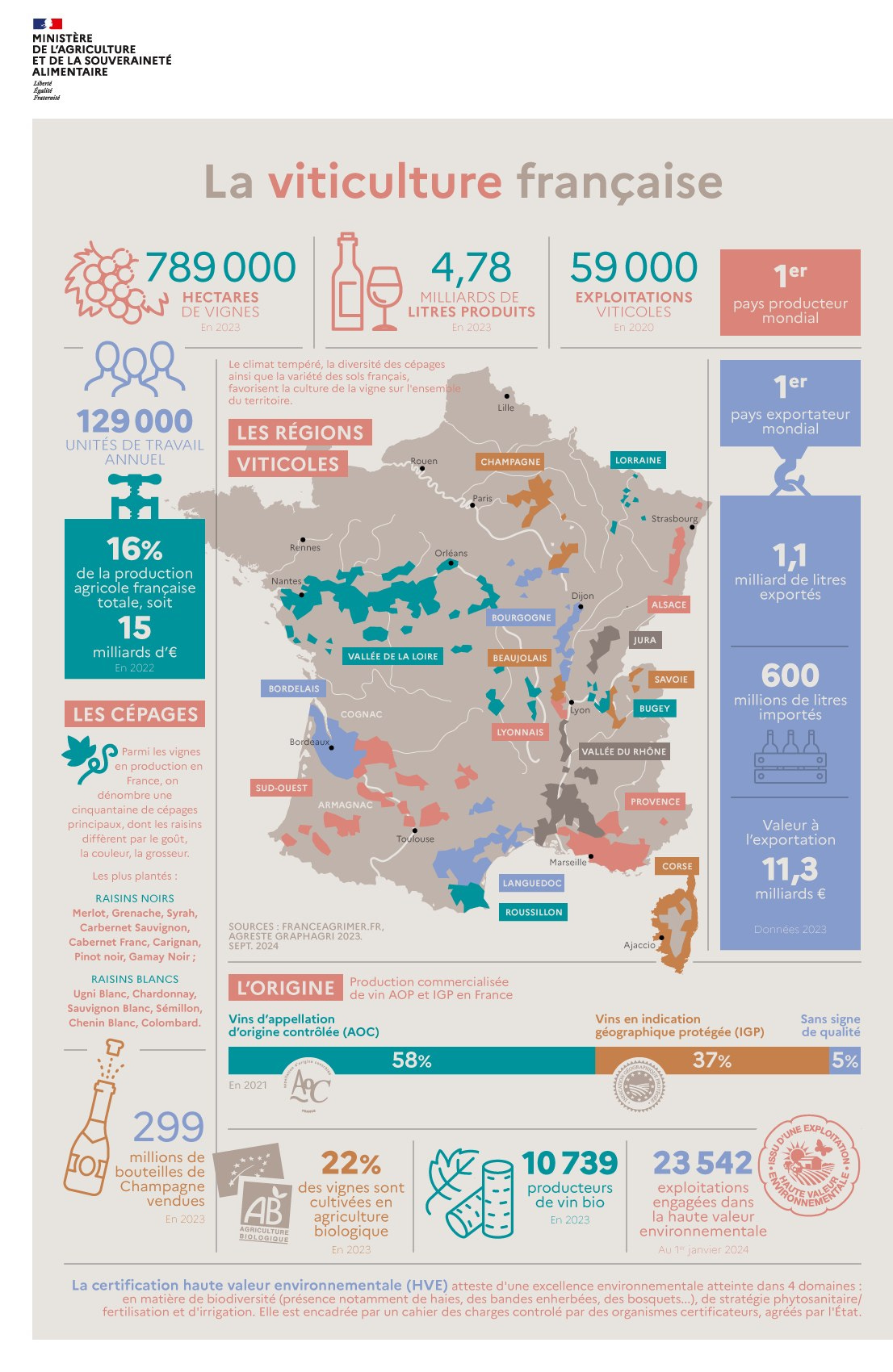Dry January en France : c'est possible ?
#51 Alcohol consumption in France: between myth and reality
🇬🇧 English version below1
Salut à toi et bienvenue dans l’édition #51 de ma Newsletter !
C’est réellement la première édition de 2025.
Oui, j’ai pris une pause bien méritée 😅 après le challenge “24 jours pour écrire en français” qui m’a occupée pendant une bonne partie des fêtes de Noël.
Mais quel plaisir de lire les textes des participant•es ! J’ai été admirative de la créativité et de l’énergie manifestées pendant ces 24 jours, bravo à toutes et tous 👏
Aujourd’hui, j’ai décidé de parler d’un sujet qui fâche (=a controversial subject) : la consommation d’alcool en France 🍷
Eh oui, le vin, le champagne en France,
c’est bien plus que de l’alcool, ça fait partie de l’identité française.
C’est un véritable art de vivre !
Sauf que quand on s’intéresse aux faits : 49 000 décès par an selon Santé Publique France.
ça fait mal…
Pour cette Newsletter, je me suis inspirée du cours que j’ai fait ce mardi soir pour le groupe d’élèves de niveau intermédiaire-avancé B1+/B2.
Pendant 1h30, nous avons eu des conversations très riches sur ce sujet délicat qui est la consommation d’alcool et nous avons comparé la situation en France avec les pays des élèves (Brésil, Espagne, Etats-Unis, Royaume-Uni, Suisse).
Il reste d’ailleurs encore 1 place pour ce cours (6 élèves maximum par groupe), inscris-toi ici pour le tester gratuitement mardi prochain, 21 janvier à 17h 👇
Je vais donc partager avec toi mes observations sur le rapport à l’alcool en France et l’attitude des Français face au défi “Dry January”.
Allez, je commence par du lourd :
1. Du vin dans les cantines scolaires en France 🍷
Oui, tu as bien lu…
Jusqu’en 1956, les enfants buvaient du vin à la cantine dans les écoles françaises 😯
Ce n’est pas une blague :
“ Les enfants étaient habitués, assez jeunes, à boire du vin [coupé à l’eau] dans les écoles et au cours des repas”
indique Bernard Basset, docteur en santé publique dans cet article.
À noter que l’interdiction de boire du vin à la cantine ne concerne que les écoliers et collégiens : les enfants jusqu’à 14 ans.
Dans les lycées, ce n’est qu’en 1981, sous le mandat de François Mitterrand, que cette interdiction a été appliquée. 🤐
Mais pourquoi laissait-on les enfants boire du vin ?
Avant 1956, les Français avaient rarement accès à l’eau potable (=drinking water) chez eux et ils pensaient que le vin donnait de la force aux enfants.
On pourrait également ajouter que le vin, dans le christianisme, est associé au “sang du Christ” et qu’il s’agit pour les hommes d’un symbole de virilité :
“Un vrai homme est un homme qui boit.”
Mais aujourd’hui, en 2025, qu’en est-il ?
2. Une personne qui ne boit pas est “chiante”.
En français, nous n’avons pas de mot pour désigner une personne qui ne boit pas d’alcool.*
En italien, par exemple, on peut dire astemio/a et c’est très utilisé.
* en réalité, le mot “abstème” existe en français mais personne ne le connait, je viens de l’apprendre en préparant cette Newsletter.
La pression à boire de l’alcool est telle que les personnes qui ne boivent pas sont souvent stigmatisées, moquées, qualifiées de “chiante” (= boring).
Comme preuve, une récente polémique datant d’avril 2024 dans une émission de talk-show française Quelle époque !
La présentatrice de l’émission, Léa Salamé (à gauche de l’image), interviewe l'acteur-humoriste-réalisateur Artus (à droite) pour son premier film “Un petit truc en plus”.
Dans la conversation, Artus lui dit qu’il a complètement arrêté de boire de l’alcool et de fumer. La présentatrice lui répond automatiquement, sur le ton de la blague :
“vous êtes devenu chiant”.
Cette phrase a provoqué une forte polémique en France et relancé les débats autour de la consommation d’alcool en France. Léa Salamé a dû s’excuser publiquement pour sa remarque maladroite (= clumsy).
En réalité, la réaction de Léa Salamé est assez représentative de la vision qu’ont les Français sur les personnes qui ne boivent pas.
Une personne qui ne boit pas doit généralement se justifier :
c’est à cause de ta religion ?
tu es enceinte ?
tu prends des médicaments ?
Ce qui est intéressant c’est qu’en 2024 (à l’époque de l’émission), les mentalités ont changé en France.
Il y a de plus en plus de personnalités publiques (comme l’humoriste Artus) qui déclarent ouvertement avoir arrêté de boire et s’opposent à cette pression sociale de boire très présente en France.
Personnellement, dans mon entourage (= around me), je rencontre de plus en plus de personnes qui ne boivent pas ou très rarement.
J’ai moi-même repensé ma consommation : plus jeune, j’aimais beaucoup faire la fête et l’alcool était omniprésent mais je pense que ceci est assez classique dans les pays occidentaux.
Le problème, c’est que même quand j’ai commencé à travailler dans une entreprise française à Paris, les occasions de boire étaient toujours là : apéros entre collègues après le travail, soirées d’entreprise, déjeuners professionnels…
Aujourd’hui, à 37 ans, je fais beaucoup plus attention au nombre de verres ET à la fréquence à laquelle je bois. J’aime boire du vin mais avec modération 😉
3. “le Dry January a été interdit en France, sur ordre du président Macron"
Cette phrase a été prononcée par le personnage de Luc (à gauche sur l’image) dans la série Emily in Paris.
Je t’ai déjà donné mon avis sur cette série que j’adore détester et qui véhicule de manière assez caricaturale les clichés sur la France et les Français.
Est-ce que c’est vrai que le Dry January ou “Mois sans alcool” , “Janvier sobre” ou encore “le défi de Janvier” a été interdit par le président ?
Eh bien, ce n’est pas totalement faux dans le sens où le gouvernement ne soutient pas de manière officielle cette initiative.
Seules les associations comme Association Addictions France financent la promotion et communiquent à ce sujet.
En 2019, Santé publique France (SPF) avait prévu de lancer une campagne similaire à celle observée au Royaume-Uni, avant que l’initiative ne soit abandonnée après des "arbitrages gouvernementaux", selon Ouest France.
Ce manque de soutien officiel était considéré par les associations comme le signe du poids des lobbies du vin dans le pays.
À titre de comparaison, la campagne du “mois sans tabac” est financée depuis 10 ans par le gouvernement pour lutter contre le tabagisme.
La différence ? La France ne produit pas de tabac et le secteur du vin représente un poids économique considérable :
Dis-moi, comment est la situation dans ton pays ? Et si tu vis en France ou as l'habitude d'y voyager, qu'est-ce que tu penses de la consommation de vin ?
Je te répondrai avec plaisir et je te dis à la semaine prochaine 👋
Alice
Hello and welcome to issue #51 of my newsletter!
This really is the first edition of 2025.
Yes, I've taken a well-deserved break 😅 after the “24 days to write in French” challenge that kept me busy for much of the Christmas holidays.
But what a pleasure to read the participants’ texts! I was in awe of the creativity and energy shown during these 24 days, well done to all 👏
Today, I've decided to talk about a controversial subject: alcohol consumption in France 🍷
Yes, wine and champagne in France..,
is much more than alcohol, it's part of the French identity.
It's a veritable art of living!
Except that when you look at the facts: 49,000 deaths a year according to Santé Publique France.
It hurts...
For this Newsletter, I drew inspiration from the course I ran on Tuesday evening for the group of intermediate-advanced B1+/B2 students.
For 1h30, we had some very rich conversations on the delicate subject of alcohol consumption, and compared the situation in France with the students' own countries (Brazil, Spain, USA, UK, Switzerland).
By the way, there's still 1 place left for this course (maximum 6 students per group),👉 so sign up here to try it out for free next Tuesday, January 21 at 5pm
So I'm going to share with you my observations on the relationship with alcohol in France and French attitudes to the “Dry January” challenge.
Let's start with the heavy stuff:
1. Wine in school canteens in France 🍷
Yes, you read that right…
Until 1956, children drank wine in the canteen in French schools 😯
“Children were used to drinking wine [cut with water] in schools and during meals at a fairly young age”
says Bernard Basset, a doctor of public health in this article.
It should be noted that the ban on drinking wine in the canteen only applies to primary and secondary school children: children up to the age of 14.
In high schools, it was only in 1981, under the mandate of François Mitterrand, that this ban was applied. 🤐
But why were children allowed to drink wine?
Before 1956, the French rarely had access to drinking water at home and they thought that wine gave strength to children.
We could also add that wine, in Christianity, is associated with the “blood of Christ” and that for men it is a symbol of virility: “A real man is a man who drinks.”
But today, in 2025, what about it?
2. A person who doesn't drink is "chiante" (=boring).
In French, we don't have a word to designate a person who doesn't drink alcohol.*
In Italian, for example, we can say astemio/a and it's very used.
* in reality, the word "abstème" exists in French but no one knows it, I just learned it while preparing this Newsletter.
The pressure to drink alcohol is such that people who don't drink are often stigmatized, mocked, called "chiant(e)" (= boring).
As proof, a recent controversy dating from April 2024 in a French talk show Quelle époque !
The show's presenter, Léa Salamé (on the left of the image), interviews the actor-comedian-director Artus (on the right) for his first film "Un petit truc en plus".
In the conversation, Artus tells her that he has completely stopped drinking alcohol and smoking. The presenter automatically answers her, in a joking tone:
“vous êtes devenu chiant”. “you've become a pain in the ass”.
This sentence caused a strong controversy in France and rekindled the debates around alcohol consumption in France. Léa Salamé had to publicly apologize for her clumsy remark.
In reality, Léa Salamé’s reaction is quite representative of the vision that the French have of people who do not drink.
A person who does not drink generally has to justify themselves:
is it because of your religion?
are you pregnant?
are you taking medication?
What is interesting is that in 2024 (at the time of the show), mentalities have changed in France.
More and more public figures (such as comedian Artus) are openly declaring that they have stopped drinking, and oppose the social pressure to drink that is so prevalent in France.
Personally, around me, I meet more and more people who do not drink or very rarely.
I myself have rethought my consumption: when I was younger, I really liked to party and alcohol was omnipresent but I think that this is quite classic in Western countries.
The problem is that even when I started working in a French company in Paris, the occasions to drink were always there: aperitifs with colleagues after work, company evenings, professional lunches…
Today, at 37, I pay much more attention to the number of glasses AND the frequency with which I drink. I like to drink wine but in moderation 😉
3. “Dry January has been banned in France, on the orders of President Macron”
This sentence was pronounced by the character Luc (on the left in the image) in the series Emily in Paris.
I have already given you my opinion on this series that I love to hate and which conveys in a rather caricatured way the clichés about France and the French.
Is it true that the Dry January or “Mois sans alcool”, “Janvier sobre” or “le défi de Janvier” has been banned by the President?
Well, it's not totally untrue in the sense that the government doesn't officially support this initiative.
Only associations like Association Addictions France finance the promotion and communicate on the subject.
In 2019, Santé publique France (SPF) had planned to launch a campaign similar to the one seen in the UK, before the initiative was abandoned after “government arbitrations”, according to Ouest France.
This lack of official support was seen by associations as a sign of the weight of the country's wine lobbies.
By way of comparison, the “Mois sans tabac” (“tobacco-free month”) campaign has been funded by the government for the past 10 years to combat smoking.
The difference? France does not produce tobacco, and the wine sector represents a considerable economic weight:
Tell me, how is the situation in your country? And if you live in France or are used to traveling there, what do you think about wine consumption?
I will be happy to answer you and I'll see you next week 👋









Salut Alice !
Au Brésil en raison de la chaleur la consommation de vin n’est pas une habitude. En relation á France et l’autres pays où il fait froid le vin aidé au bien être aussi. Il est importante savoir équilibré la quantité .
Salut Miriam, oui c'est sûr que quand il fait chaud, on n'a pas envie de boire du vin (même si en France il y a le rosé en été haha) mais cela me semble intéressant (et nécessaire) de réfléchir à sa consommation d'alcool en général.